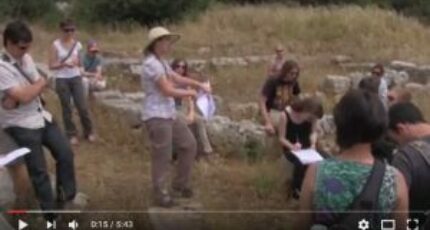Why Learn Greek
Proficiency in Modern Greek unlocks the door to a civilization that has evolved from its Classical, Byzantine, and Ottoman pasts. This evolution has continued into the Greek Diaspora, leading thousands of Greek and Cypriot immigrants to the United States. Historically, Greece and the United States have also been strong allies in every conflict of the 20th and 21st century.
Learning Modern Greek allows students better access to Greek and Cypriot history as well as a deeper understanding and appreciation of these rich contemporary cultures.
The Language of Philosophy and “STEAM”
It’s no secret that Greek is the language of philosophy, but it is also the language of STEAM—an acronym for the areas of science, technology, engineering, art and architecture, and mathematics. Learning Greek provides students with a deeper understanding of this terminology by accessing it through its original form. Today, Greek artists, filmmakers, and writers are being recognized in the United States for their contributions. Most recently, two Greek directors were nominated for the 2017 Oscars.
The Language of Our Founding Fathers
Due to their deep appreciation of Ancient Greek culture, our founding fathers studied and used Greek as the foundation of their democratic movement. Many inscriptions, philosophical ideals, and ideas in early America came directly from the Greek language and culture.
The Language of Languages
Greek is one of the oldest written languages on Earth, one of the first Indo-European languages ever written, and the language with the longest history of alphabetic graphology on the planet. The Greeks have always been aware of the special beauty and power of their own tongue. Even the word barbarian comes from the Greek word βάρβαρος, meaning “one who does not speak Greek.”
The Language of English Root Words
There are countless words that arrive to English directly from Greek, in addition to those which come indirectly through Latin and other languages. Approximately 35 percent of English words stem from Greek words. Students who learn Greek are better able to learn and identify root words, increasing their English language vocabulary while learning Greek.
The Language of the European Union & the Mediterranean
As member states of the European Union, Greece and Cyprus play integral roles in the geopolitical makeup of Europe and the Mediterranean. Through their strong historical ties in both Europe and the Middle East, Greece and Cyprus are able to bridge East and West politically, culturally, and socially.
The Language of Multiculturalism
Greek has been spoken and used across different civilizations and peoples. Modern Greek history demonstrates that it is the language of multiculturalism, as it is spoken by Greek Orthodox and Catholic Christians, Greek Jews, Greek Muslims, and as an ancient and modern minority language in many different countries.

The Language of Resistance
Greece played a vital role in World War II in Europe, eventually delaying Hitler’s army on their march on Moscow. The Greeks showed tremendous strength and bravery in fighting for justice, including protecting Greek Jews. Hitler is quoted to have said, “The Greek soldier, above all, fought with the most courage.” Winston Churchill, in awe of the bravery of Greeks resisting fascism, said, “Hence, we will not say that Greeks fight like heroes, but that heroes fight like Greeks.” During the military junta in 1967 – 1974, the art of resistance flourished through literature, art, and film.
The Language of Literature
Greece has produced two Nobel Laureates in Literature during the 20th century: Giorgos Seferis (1963) and Odysseas Elytis (1979). These Laureates—as well as other poets and writers such as C. P. Cavafy, Yiannis Ritsos, and countless others—have captured the experience of belonging to the Ancient and Modern worlds at once, of being the bearers of this great civilization, and of what it truly means to be human.
Many great works of poetry have also been set to music, which has broadened their reach in Greek culture. Learning Greek opens us to the unimaginable world of this great literature that has influenced countless writers throughout Europe, the United States, and the world.
The Language of History
Learning Modern Greek provides access to many opportunities in the fields of history and archaeology. So much is written in Greek by Greek archaeologists and historians about Greek history, through all its time periods, that is not accessible in English. Learning Modern Greek allows students to immerse themselves in the history, learn from locals, and understand that Greece today—including its culture and its people— is still very much a part of this history.
Adapted from the ACTFL Modern Greek Special Interest Group
Scholarships and Grants
AHEPA Educational Foundation Scholarship
The American Hellenic Educational Progressive Association (AHEPA) grants multiple awards of up to $2,000 to high school seniors and university students who are active members of the AHEPA Family or who are the child of an AHEPA (or affiliated group) member.
Alpha Omega Council Peter Agris Memorial Journalism Scholarships
The Council awards $5,000 scholarships to journalism and communications students of Greek-American descent.
MGSA Constantinides Memorial Translation Prize
Administered by the Modern Greek Studies Association, and open to students, scholars, and anyone else who has knowledge of the Greek language, the scholarship awards $500 for a work translated into English.
See also the extensive list of awards compiled by the Hellenic Communication Service, which includes many grants specific to local regions or religious organizations.
Looking for a Greek Program?
While initially developed to report language enrollment figures, the MLA database provides a comprehensive listing of postsecondary language programs, allowing you to refine your results by language, geographic area, and/or type of institution. The data is based on MLA’s 2013 survey.
To Get Started:
- Select your language(s), up to eight
- Narrow your search, as desired, and click “search now”
- Expand your findings to reveal specific schools offering programs in your language by clicking on the small triangles on your results page




